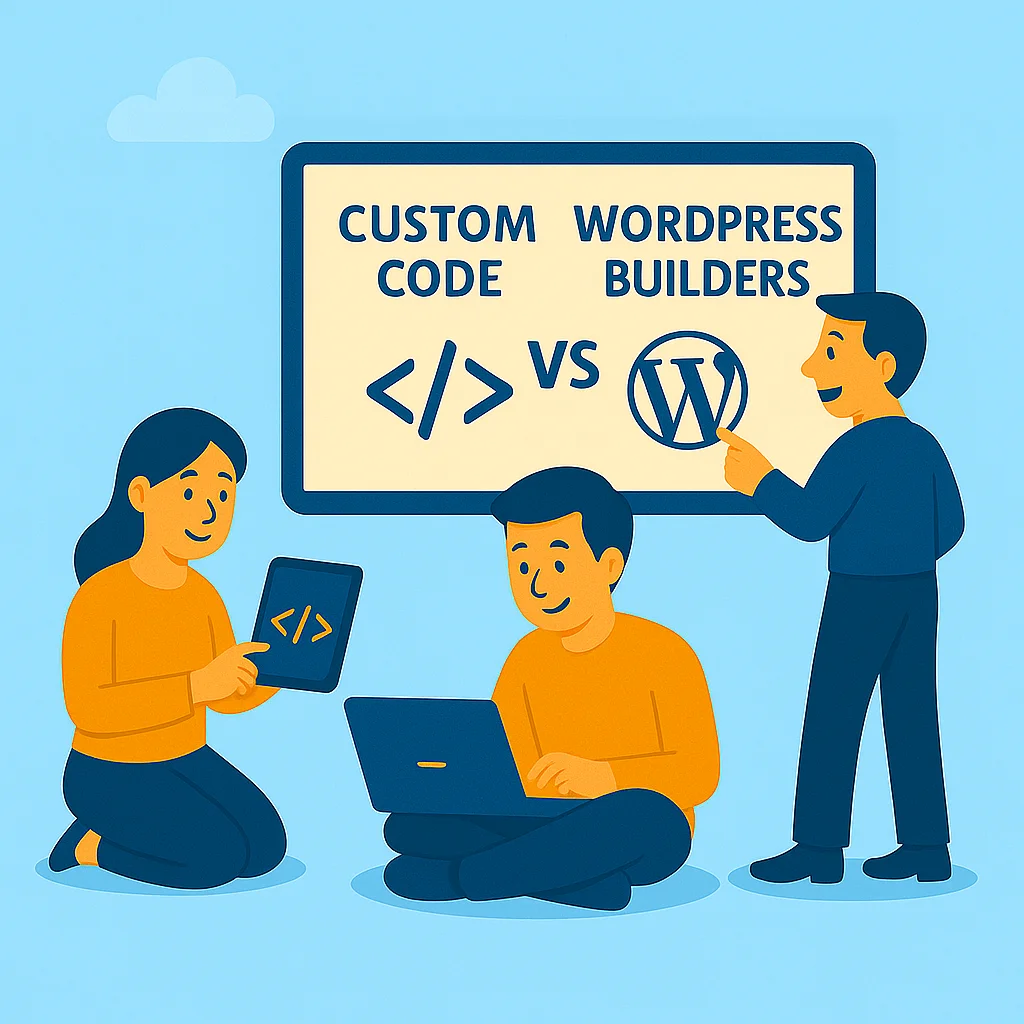
WordPress page builders like Elementor and Divi offer a quick, code-free way to design websites. They let you drag, drop, and publish without needing a developer. However, this convenience can come at a hidden cost in terms of how your site is built and performs. AstroJS, on the other hand, is a modern framework for custom-coded sites that emphasizes clean, lightweight output.
In this article, we compare the two approaches across seven key areas – from code semantics to SEO – so business owners and semi-technical readers can understand the trade-offs and make an informed decision. If you're considering building a small business website, this comparison will help you choose the right approach.
WordPress Builders vs. AstroJS Comparison
| Aspect | WordPress Builders | AstroJS Custom |
|---|---|---|
| Setup Speed | Fast (drag & drop) | Slower (custom coding) |
| Performance | 40-50% slower on mobile | Lightning fast (<2.5s) |
| SEO Score | Mid-80s typical | 100/100 possible |
| Code Quality | Bloated, non-semantic | Clean, semantic HTML |
| Maintenance | Plugin conflicts, updates | Minimal, stable |
| Customization | Limited by builder UI | Unlimited flexibility |
Semantics: Clean vs. Cluttered HTML
One critical difference lies in the HTML markup each approach produces. WordPress builders often generate bloated, non-semantic code – in other words, lots of extra <div> wrappers and confusing structure that doesn't convey meaning. For example, Elementor has been noted to omit proper section elements entirely, relying on "ghost" wrapper <div>s that add no semantic value.
Similarly, many builders output dozens of nested elements for a simple piece of content, where only a few well-chosen HTML tags would do. This lack of semantic structure can hurt accessibility (screen readers struggle to navigate) and SEO (search engines prefer clearly structured content).
Common Builder Code Issues
- Excessive nested <div> elements with no semantic meaning
- Missing proper heading hierarchy (<h1>, <h2>, etc.)
- Lack of <section> and <article> structure
- Inline styles mixed with external CSS
- Accessibility landmarks missing or incorrect
By contrast, AstroJS puts developers in full control of the HTML. Since you hand-code the layout (or use lightweight components), you can ensure the markup is semantic and lean – headings are real <h1>, <h2> tags in order, sections use proper <section> or <article> tags, and lists use <ul>/<ol> as they should.
AstroJS Code Benefits
- Clean, semantic HTML5 structure
- Proper heading hierarchy for accessibility
- Minimal, purposeful markup
- Clear separation of content and styling
- Search engine-friendly structure
Performance: Fast Loads vs. Heavy Pages
Website performance – how quickly your pages load and respond – is another area where builders and custom AstroJS sites differ greatly. Page builders tend to include a lot of baggage under the hood. They often load many scripts, styles, and elements even for features you're not using, which drags down speed.
WordPress Builder Performance
- 40-50% slower on mobile devices
- 1MB+ of extra resources common
- 100+ HTTP requests typical
- Bloated CSS and JavaScript
- Unused features still load
AstroJS Performance
- Sub-3 second load times typical
- 72% smaller HTML output
- 90% less CSS bloat
- Minimal JavaScript by default
- Only load what you need
Industry analyses have found that pages built with popular site builders can load 40–50% slower on mobile devices than equivalent custom-coded pages. This is largely due to bloated code and asset loading. For example, one test showed an Elementor-built page generated over 1 MB of extra resources across 100+ HTTP requests, whereas a hand-coded theme for the same content needed under 300 KB and far fewer requests – resulting in a ~2.5 second faster load time.
SEO: Search Visibility and Code Impact
SEO (Search Engine Optimization) is closely tied to both the structure and speed of your site. Unfortunately, many page builders inadvertently undermine SEO. The bloated HTML and non-semantic layout produced by builders can make it harder for search engine crawlers to discern the hierarchy of your content.
Google has explicitly affirmed that page speed and performance metrics factor into rankings, especially on mobile. Thus, the heavy scripts and sluggish load times common on builder-based sites are red flags to search engines. For comprehensive SEO guidance, check out our Google Analytics and Search Console guide.
Maintenance: Stability and Ongoing Upkeep
Running a business website isn't a one-and-done deal – you'll need to update content, add features, and keep things secure over time. Here, the maintenance experience between WordPress builders and custom-coded AstroJS sites diverges significantly.
Builder Maintenance Challenges
Plugin conflicts, update breakages, dependency web, shortcode lock-in, and ongoing troubleshooting
AstroJS Stability
Minimal dependencies, version control, predictable updates, and transparent code maintenance
WordPress page builders come with a web of dependencies. You're not only relying on WordPress itself, but also on the builder plugin and any other plugins in your stack. Updates can be a double-edged sword: a new release of the builder or WordPress core might fix bugs, but it can also break your site's layout or features.
Features: Out-of-the-Box vs. Tailored Flexibility
Page builders shine in the features and convenience department – at least initially. Elementor, Divi, and similar builders come with a smorgasbord of pre-built widgets, templates, and design elements. Need a contact form, slider, or pricing table? Just drag it in.
Case Study: Brand Farms - Dynamic AstroJS in Action
Brand Farms needed a way to show real-time store hours and seasonal apple availability across multiple locations. With WordPress builders, this would require multiple plugins, complex shortcodes, and constant manual updates.
Our AstroJS solution created dynamic store modules and apple availability components that update from a single data source. The apple modules show what's in season and plug into multiple pages, with structured JSON-LD data that automatically tells Google what products they have available.
View the complete Brand Farms project to see how our custom AstroJS development delivers dynamic functionality without the bloat of WordPress builders.
Code Quality: Drag-and-Drop vs. Handwritten Excellence
Consider the overall code quality and maintainability of your site. WordPress page builders are notorious for outputting code that a human developer would likely never write. The drag-and-drop convenience often leads to HTML and CSS that violate best practices.
Builder Code Problems
Common issues include repetitive styles, inline CSS, deeply nested elements, and IDs or classes on wrong elements making custom styling harder.
AstroJS Code Quality
Clean, intentional code structure with reusable components, semantic markup, and optimized assets that any developer can understand and maintain.
The Hidden Costs: Total Cost of Ownership
While WordPress builders appear cheaper upfront, the total cost of ownership often exceeds custom development when you factor in hosting, premium plugins, maintenance, and ongoing support needs.
Complete Care vs. DIY Maintenance
Our managed hosting solutions include everything you'd pay for separately with WordPress builders – and more. For what most businesses pay for premium WordPress hosting alone ($125-300/month), you get:
WordPress Builder Typical Costs
- • Premium hosting: $50-200/month
- • Builder pro license: $50-400/year
- • Premium plugins: $100-500/year
- • Security monitoring: $10-50/month
- • Developer maintenance: $100-300/hour
- • Plugin conflict troubleshooting: Unpredictable
Our AstroJS + Hosting Package
- • Enterprise hosting: $125-300/month
- • All updates & maintenance: Included
- • Security monitoring: Included
- • Performance optimization: Included
- • Feature development: 2 hours/month included
- • Zero plugin conflicts: Guaranteed
You get enterprise-grade hosting, complete maintenance, and ongoing development support – all for less than most businesses spend on premium WordPress hosting alone.
Support: Getting Help and Long-Term Reliability
When something goes wrong or you need to extend your website, the level of support and flexibility you have is crucial. With popular WordPress builders, you might find yourself in a tricky spot when facing an issue.
Builder limitations can force you to seek additional plugins for functionality the builder doesn't support, each coming with its own support channel. You're dependent on the tool's creators to fix core issues – you can't crack open Elementor's code and patch it yourself if there's a bug or missing feature.
Making the Right Choice for Your Business
WordPress page builders have their place – they make it possible to get a visually pleasing site up and running quickly without writing code. However, the trade-offs become apparent as your business grows and your website needs to excel in performance, SEO, and adaptability.
Custom building your site with a modern framework like AstroJS flips that script. You gain lean, semantic markup, lightning-fast page loads through optimized static rendering, and a solid foundation for SEO success. You also get the peace of mind that comes with maintainable code – no surprise breakages from plugin updates, and full control to implement any feature or design you need.
The Strategic Choice
Your website is often the first impression you make on customers. Ensuring that it's fast, robust, and finely tuned under the hood will help that first impression be a great one.
Clean code and speed aren't just developer obsessions – they're smart business strategy. Learn more about why we use AstroJS for all our projects.
Conclusion
The choice boils down to this: a one-size-fits-most builder solution, or a bespoke build that's crafted for excellence. For many businesses aiming to stand out in a competitive online landscape, the latter is worth the effort.
If you require a quick brochure site and don't mind some technical debt, a page builder can suffice. But if you value performance, scalability, and quality – the kind that impresses users and search engines alike – investing in a custom-coded AstroJS site can pay dividends.
By choosing the right approach now, you set your website up to be an asset rather than a hurdle in achieving your goals. If you're ready to experience the difference that clean code and superior performance can make, our team is here to help you build something exceptional.

